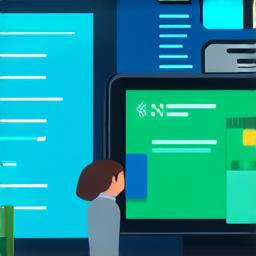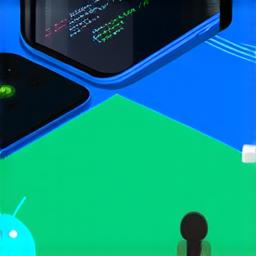Android mobile application development requires a combination of technical and soft skills. While some skills such as Java programming language and Android Studio IDE are essential for the job, others like user interface design, database management, debugging, testing, security, performance optimization, third-party libraries and frameworks, collaboration and communication, and continuous learning are critical for creating successful applications. In this article, we will delve deeper into each of these skills and discuss how to acquire them.
1. Java Programming Language
Java is the primary programming language used for Android development. It is an object-oriented language that is easy to learn and use, making it a popular choice for beginners. However, even experienced developers need to stay up-to-date with the latest Java updates and libraries to create modern and efficient applications.
To acquire Java programming skills, you can start by taking online courses or attending workshops on Java development. There are many resources available online that provide beginner-friendly tutorials and exercises to help you learn the language. Additionally, practicing coding challenges and working on small projects will help you apply your knowledge and improve your skills.
2. Android Studio Integrated Development Environment (IDE)
Android Studio is the official IDE for Android development. It provides a comprehensive set of tools and features that make it easy to develop, debug, and test Android applications. Android Studio also supports Java, making it an essential tool for any Android developer.
To acquire Android Studio skills, you can start by taking online courses or attending workshops on Android development using Android Studio. You can also explore the official documentation and tutorials available from Google to learn more about the IDE’s features and capabilities. Additionally, practicing coding challenges and working on small projects will help you apply your knowledge and improve your skills.
3. User Interface Design
A well-designed user interface (UI) is crucial for the success of an Android application. Developers need to have a good understanding of UI design principles and be able to create visually appealing and intuitive interfaces that are easy to use.
To acquire UI design skills, you can start by taking online courses or attending workshops on UI design. There are many resources available online that provide beginner-friendly tutorials and exercises to help you learn the basics of UI design. Additionally, practicing designing mockups and prototypes will help you apply your knowledge and improve your skills.

4. Database Management

Android applications often require access to databases, whether it’s for storing user data or managing application settings. Developers need to have a good understanding of database management systems (DBMS) such as SQLite and MySQL, and be able to design and implement efficient data storage solutions.
To acquire database management skills, you can start by taking online courses or attending workshops on database management using SQLite and MySQL. There are many resources available online that provide beginner-friendly tutorials and exercises to help you learn the basics of database management. Additionally, practicing designing and implementing database schemas will help you apply your knowledge and improve your skills.
5. Debugging and Testing
Debugging and testing are critical components of the development process. Developers need to have a strong understanding of how to debug code, identify bugs and issues, and test applications thoroughly to ensure they are stable and reliable.
To acquire debugging and testing skills, you can start by taking online courses or attending workshops on debugging and testing Android applications. There are many resources available online that provide beginner-friendly tutorials and exercises to help you learn the basics of debugging and testing. Additionally, practicing writing unit tests and integrating them with your code will help you apply your knowledge and improve your skills.
6. Security
Security is an essential consideration for mobile application development, particularly for financial and sensitive data applications. Developers need to have a good understanding of security best practices, including encryption, authentication, and authorization, to create secure and protected applications.
To acquire security skills, you can start by taking online courses or attending workshops on Android security. There are many resources available online that provide beginner-friendly tutorials and exercises to help you learn the basics of mobile application security. Additionally, practicing implementing security measures in your applications will help you apply your knowledge and improve your skills.
7. Performance Optimization
Performance optimization is critical for creating high-performing Android applications that provide a seamless user experience. Developers need to have a good understanding of performance metrics such as CPU usage, memory usage, and battery consumption and be able to optimize code and data storage to improve application performance.
To acquire performance optimization skills, you can start by taking online courses or attending workshops on Android performance optimization. There are many resources available online that provide beginner-friendly tutorials and exercises to help you learn the basics of performance optimization. Additionally, practicing profiling and optimizing your code will help you apply your knowledge and improve your skills.
8. Third-Party Libraries and Frameworks
Third-party libraries and frameworks are widely used in Android development to speed up development and add functionality to applications. Developers need to have a good understanding of how to use third-party libraries and frameworks effectively to create efficient and robust applications.
To acquire third-party library and framework skills, you can start by taking online courses or attending workshops on using third-party libraries and frameworks in Android development. There are many resources available online that provide beginner-friendly tutorials and exercises to help you learn how to use popular third-party libraries and frameworks like Retrofit, OkHttp, and Gson.

9. Collaboration and Communication
Collaboration and communication skills are critical for working in a team environment. Developers need to be able to communicate effectively with team members, stakeholders, and clients to ensure that projects are completed on time and within budget.
To acquire collaboration and communication skills, you can start by taking online courses or attending workshops on effective communication and collaboration in the workplace. There are many resources available online that provide beginner-friendly tutorials and exercises to help you learn how to communicate effectively with others.
10. Continuous Learning
Finally, continuous learning is critical for staying up-to-date with new technologies and trends in Android development. Developers need to have a willingness to learn and adapt to new tools and techniques to create efficient and innovative applications.
To acquire continuous learning skills, you can start by taking online courses or attending workshops on new technologies and trends
